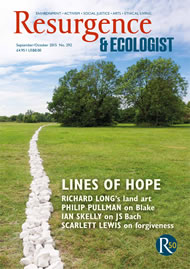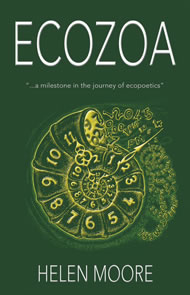With its preference for images over concepts, and its delight in the fluent way that metaphor illuminates the relations between things, poetry is perhaps the most intrinsically ecological of the arts. So in a time when the natural world beloved by Shakespeare and Wordsworth is increasingly at risk, it is unsurprising that the need to write verse is being widely felt. Some of it poses such a direct response to the accelerating environmental crisis that a new genre of poetry has evolved. With her first volume, Hedge Fund, Helen Moore emerged as a significant exponent of eco-poetry, and her new collection, Ecozoa, has already been hailed by John Kinsella, a Cambridge don and a poet himself, as “a milestone in the journey of ecopoetics”.
The title of the volume fuses two germane associations: Thomas Berry’s rejection of the term ‘Anthropocene’ as a description of our age in favour of the more widely embracing term ‘The Ecozoic Era’; and William Blake’s visionary poetic myth of the four Zoas, those energetic elements of the life force which, when held in balance together, form “a Perfect Unity”. The names Blake gave them are Tharmas, Urizen, Urthona and Luvah, and his account of their various natures prefigures by more than a century Jung’s identification of sensation, thought, intuition and feeling as the four psychological functions. Not the least important feature of this book is its intention to bring the abiding relevance of Blake’s poetic myth into contemporary focus by making one of the Zoas the presiding spirit of each of its four parts.
But Helen Moore is an ardent and courageous activist as well as a poet, and while challenging the various forces that exploit the natural environment in ruinous ways, this collection of poems also calls into question the judgement reached by Jonathan Bate in his study The Voice of the Earth that the language of eco-poetics and that of eco-politics are two distinct modes of discourse. Though poetry and propaganda can indeed be uneasy bedfellows, Ecozoa is a gallant attempt to revivify that radical tradition of English poetry in which outrage, contempt, defiance and pity have found powerful expression through verse. Were he alive today, I believe that William Blake would understand exactly what Helen Moore is about.
The focus of these poems is constant in its vision of the unity of the Earth and its fierce desire to protect all of it that is under threat, yet their range and tone are wide-reaching. Their imagery is deeply embodied, their ironies caustic and witty, their praise for the Earth’s beauty rhapsodic. They also take the reader on a journey across time, from prehistory through the present crisis towards a hopeful vision of the future. Passionate in both its affirmations and its rage, and moving in its vulnerability and grief, this strong collection of poems is a powerful work of the ecozoic imagination.








